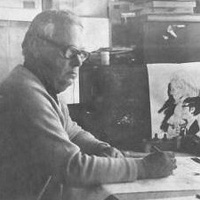Keith Chatto: Difference between revisions
m (Date of birth added) |
(One link added / concerning downloading book "The Epic (Annotated) Life Story of Keith Chatto") |
||
| Line 63: | Line 63: | ||
*[http://www.collectingbooksandmagazines.com/chatto.html Collecting Books and Magazines - Keith Chatto] | *[http://www.collectingbooksandmagazines.com/chatto.html Collecting Books and Magazines - Keith Chatto] | ||
*[http://www.lambiek.net/artists/c/chatto_keith.htm Lambiek - Keith Chatto] | *[http://www.lambiek.net/artists/c/chatto_keith.htm Lambiek - Keith Chatto] | ||
*[http://ohdannyboy.blogspot.fr/2014/04/the-epic-annotated-life-story-of-keith.html], about book "The Epic (Annotated) Life Story of Keith Chatto" | |||
[[Category:Cover artists|Chatto, Keith]] | [[Category:Cover artists|Chatto, Keith]] | ||
Revision as of 14:33, 27 May 2015
| Ronald Keith Chatto | |

| |
| Biographical information | |
| Born: | November 30, 1924 |
|---|---|
| Died: | October 22, 1992 |
| Nationality: | |
| Occupation: | Cover artist |
| Website: | N/A |
Keith Chatto was an Australian illustrator and cartoonist.
Biography
Keith Chatto was born in Kogarah, New South Wales in 1924. He was educated at Kogarah Primary School, Canterbury High School and Sydney Grammar School. On leaving school he found work with the art department of Greater Union Theatres. He then drawing aircraft recognition charts for the Australian Air Training Corps before enlisting with the RAAF.
In 1946 Chatto created the comic strip "Destiny Scott" for the Sydney Morning Herald. In 1947 he created two comic strips for The Australian Sunbather, a nudist magazine. He went on to produce the comics "Bunny Allen", "The Glamour Girl" and "The Buccaneer", as well as "Lone Wolf" for Atlas Publications in 1949 and "Steven Carlisle" in 1954.
By 1955 Keith Chatto start working mostly with commercial art including magazine illustrations, record sleeves and cover illustrations for pulp fiction novels. With the introduction of television Chatto left the comic book industry to become a freelance film producer and cine cameraman. On a part-time basis he did comic book covers for Page Publications and a series of Skippy comics (1967).
In 1972 Chatto started "Flame and Ash" and "Randy and Cee Cee" in 1973. In 1977, he took over the Sunday paper version of "Air Hawk and the Flying Doctors" from John Dixon. Keith Chatto was the first Australian artist to illustrate a full-length Phantom story, Rumble in the Jungle (1990), which was followed by two more stories, Return of the Singh Brotherhood and The Kings Cross Connection.
Mandrake work by Keith Chatto
Covers
Young's Merchandising
Photo-Type Press
Page Publications
Frew Publications
References
- Wikipedia - Keith Chatto
- Collecting Books and Magazines - Keith Chatto
- Lambiek - Keith Chatto
- [1], about book "The Epic (Annotated) Life Story of Keith Chatto"




















